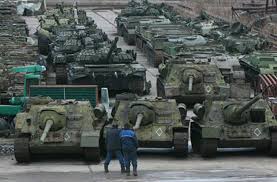As Russia’s army build-up in Ukraine continues, NATO announced Monday that it is deploying additional personnel and sending more ships and fighter jets to Eastern Europe.
It announced that it is bolstering its “deterrence” presence in the Baltic Sea region. A number of the 30-nation military alliance’s members have pledged troops and weapons.
Denmark is deploying F-16 warplanes to Lithuania and sending a warship to the Baltic Sea. Spain is sending ships to join NATO’s permanent maritime force, and fighter jets to Bulgaria are being considered. NATO has stated that France is prepared to send soldiers to Bulgaria.
“NATO will continue to take all necessary steps to secure and defend all Allies, including bolstering the Alliance’s eastern flank.” In a statement, NATO Secretary-General Jens Stoltenberg stated, “We will always respond to any deterioration of our security environment, including by bolstering our collective defense.”
THIS IS A UPDATE ON BREAKING NEWS.
Ireland cautioned that further Russian war games off its coast are not welcome, given tensions over whether President Vladimir Putin plans to attack Ukraine, as European Union foreign ministers sought to show renewed commitment in support of Ukraine on Monday.
“All European Union members are united.” “With tight coordination with the US, we are displaying unprecedented unanimity on the situation in Ukraine,” EU foreign policy chief Josep Borrell told reporters in Brussels.”We are not going to do the same thing,” Borrell said when asked if the EU would follow the US and force the families of European embassy workers in Ukraine to leave. He stated that he is eager to hear from Secretary of State Anthony Blinken on the matter.
On Monday, the United Kingdom announced the departure of several ambassadors and their dependents from its embassy in Kyiv. The action was made “in response to the mounting danger from Russia,” according to the Foreign Office.
Irish Foreign Minister Simon Coveney said he would warn his peers at the EU summit in Brussels that Russia intends to perform war drills 240 kilometers (150 miles) off Ireland’s southwest coast, in international waters but also within the country’s exclusive economic zone.
“We don’t have the capacity to stop it,” Coveney said, “but I’ve made it clear to the Russian embassy in Ireland that it’s not welcome.” “In the context of what’s going on with and in Ukraine, this is not the time to ramp up military operations and tension.”
“The fact that they’re doing it on the EU’s western borders, if you will, off the coast of Ireland, is something that, in our opinion, is simply not acceptable or wanted right now, particularly in the coming weeks,” he continued.
According to diplomats and officials, the ministers will reiterate Europe’s criticism of Russia’s military build-up near Ukraine, which includes an estimated 100,000 troops, tanks, artillery, and heavy equipment, during Monday’s meeting, which Blinken will attend electronically.
They’ll continue calls for discussion, including through the European-backed “Normandy format,” which managed to de-escalate tensions in 2015, a year after Putin’s annexation of Ukraine’s the Crimean Peninsula. Fighting in eastern Ukraine has claimed the lives of nearly 14,000 people and continues to rage.
The ministers will warn that if Putin moves against Ukraine again, Russia will face “huge consequences and grave costs,” both financial and political. The EU believes that if Ukraine is attacked, it will face severe sanctions within days.
Over the weekend, some of the EU’s closest allies — Estonia, Latvia, and Lithuania — revealed that they intend to transfer anti-tank and anti-aircraft missiles built in the United States to Ukraine, a decision backed by the US.
However, there have been concerns voiced about the EU’s unity. Diverse political, economic, and energy concerns have traditionally divided the 27-nation bloc in its attitude to Moscow. Around 40% of the EU’s natural gas imports originate from Russia, with much of it passing through Ukraine via pipelines.
Gas prices have risen dramatically, and despite the high costs, the president of the International Energy Agency has stated that Russian energy giant Gazprom is already lowering its supplies to the EU in late 2021. Putin claims that Gazprom is adhering to its contractual responsibilities and is not exerting pressure on Europe.
The two great powers of the EU appear to be the most cautious. The Nord Stream 2 pipeline from Russia, which is finished but not yet operational, has become a bargaining chip for Germany. Emmanuel Macron, the French president, has once again rebuffed proposals for an EU conference with Putin.
France and Germany originally questioned US intelligence reports that Moscow was planning an invasion late last year.
Vice Admiral Kay-Achim Schoenbach, the Chief of the German navy, resigned late Saturday after coming under fire for declaring that Ukraine will not reclaim the Crimean Peninsula and indicating that Putin deserved “respect.”
Viktor Orban, the Prime Minister of Hungary, is to meet with Putin next week to discuss a Russian-backed project to expand a nuclear power facility in Hungary.
Nonetheless, diplomats and officials claimed that the European Commission, the EU’s executive branch, is working on tough measures. They were, however, hesitant to identify what the measures might be or what behavior by Russia would trigger them.
The goal, they said, is to match the concerns Putin has sown about his intentions for Ukraine with uncertainty about what retaliatory European action may look like or when it might occur.
For the time being, the Europeans must wait to see if Putin is satisfied with progress in discussions with the US, coordinate with Blinken on a response in the event that things go wrong, and rely on the economic deterrence offered by the EU’s status as Russia’s largest trading partner.

















